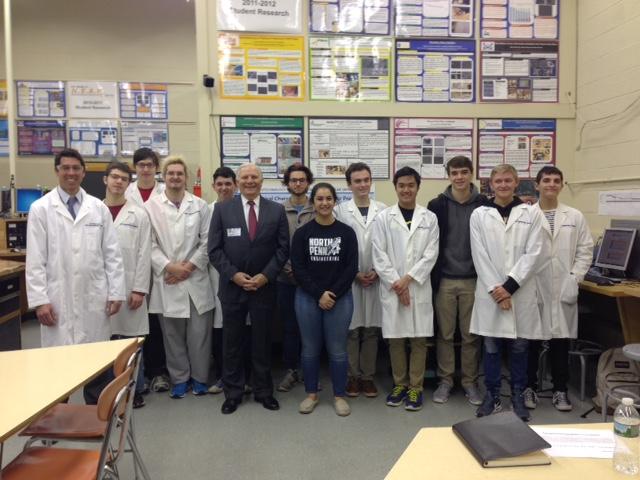PA State Senator Bob Mensch visits EDD student research teams
TOWAMENCIN- It is rumored that one of NPHS’s best kept secrets resides in H-pod. During an open lab on Wednesday, PA state Senator Bob Mensch observed the work of nine Engineering Design and Development (EDD) student research teams. Among others, the research projects students worked on included improving wireless energy transfer for charging cellphones, creating energy harvesting shingles that can produce energy from sunlight, wind, rain, and temperature changes, developing battery separators that are energy efficient, and using virtual reality to enhance learning in the classroom.
Like many who are unfamiliar with the progress that EDD students accomplish inside of NPHS, Mensch was blown away.
“It goes well beyond anything that I have envisioned,” Mensch said. “What impresses me most is… the enthusiasm and the knowledge of the students and the collective enthusiasm of the team members and the way they are approaching their problems and the kind of discussions that they are having… I think there is a bright future here for these young people.”
Mr. Michael Boyer, an engineering teacher at NPHS, was impressed with Mensch’s ability to connect with the students.
“He brought a lot of engineering knowledge with him, and it was neat,” Boyer said. “When we were talking, he was bringing up points and we were like, ‘Yeah, exactly!’ We were kind of high fiving each other. It was really cool, so we had a good conversation.”
Mensch’s visit is a result of a once in a lifetime opportunity for the engineering students. After Dr. James Perkins, the head of science research at St.Paul’s school, payed NPHS a visit in the fall, students were invited to join the International Science Conference at St. Paul’s School in London held on March 10-11, 2017.
Of the nine research teams at NPHS, three were selected to represent NPHS: Wireless Energy Transfer System (Engy Khoshit, Scott Schrum, and Noah Wendt), Energy Harvesting Roof Shingles (Anthony Brigidi, Jason Ellstrom, and TJ Schmidt), and Advanced Battery Separators (James Drinkwater and Jake Yoder).
In addition to having the opportunity to present their research to other students from across the globe, these students will be the first ever from the US to do so, as Boyer explained.
“We’re basically representing U.S. high schools at this presentation, which is exciting,” Boyer said.
To the students involved, the whole ordeal is both exciting and surreal.
“It’s still sinking in,” Schmidt said.
“It doesn’t feel real… we’re just doing our work and get to share it with the world,” Koshit said.
The conference is split up into two days. On day one, students from all over the world will present their research on stage. Each school is given a time allotment of 35 minutes to present research team findings. In addition, teams will display poster boards that illustrate their research. Visitors will be allowed to ask research teams about their work, which, as Boyer pointed out, is an opportunity that most high school students do not have.
“It’s a very open dialogue, so they can actually have a more informal discussion about their research and dig deeper with people who are interested in learning more,” Boyer said. “Being able to clearly articulate what they have done, how they have done it, and what their results are to an international audience is not something that high school students typically get a chance to do.”
On day two, students participate in a design competition. Equipped with a briefing packet and a box of parts, students are tasked to spontaneously develop a solution to a problem they are given by designing a machine or contraption. Boyer suspects that the design competition will help in “broadening [students’] horizons and perspectives.”
“It will be a unique opportunity for all of us,” Boyer said. “I’m hoping there will be time for open collaboration and discussion.. I think that will be neat for the students just to talk and hang out and have fun.”
Overall, the opportunity will help engineering students beyond the classroom.
“This is going to be a neat growing opportunity for them from a professional and an engineering perspective,” Boyer said. “There’s a lot that they are going to gain from this.”
At the conclusion of the open lab, Mensch walked away from NPHS with a deep appreciation for the Tech Ed Department and what it does.
“I appreciate how expensive it is and how difficult it is,” Mensch said. “The intent is to always facilitate education.”
Boyer appreciated the fact that Mesch took the time out of his day to pay NPHS a visit.
“It was neat to have somebody… outside of education that has the ability to impact education to learn what we can do when we are given the resources to do the things we can. It was really nice for him to come and see what we do, and it was fun,” Boyer said.
Although supportive of the students’ endeavors, Mensch was unable to work around PA’s 3 billion dollar deficit and grant funding towards the trip.
“There’s a whole new set of challenges and what it says to me is that the entire method of funding for education needs to be reformed,” Mensch said. “Maybe [government funding] is not the best way to fund education… The answer isn’t in school funding, the answer isn’t in property taxes. It’s somewhere in between.”
Fortunately, the Tech Ed Department has received funding from companies like Toshiba and Hitachi. However, the most funding has come from the North Penn Educational Foundation.
“Every single year they give us a lot of money to help our students do their research. We couldn’t do what we do without them,” Boyer explained.
The Tech Ed Department has 14 days to raise $7000 for the trip. Anyone can donate to the cause through this Gofundme page: https://www.gofundme.com/t4-nphs-nano-presentation-in-london


